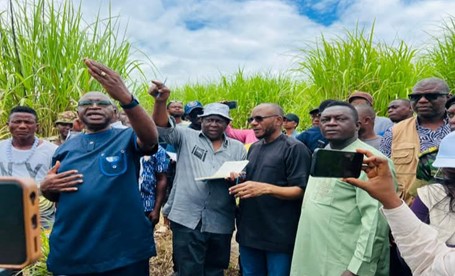By Millicent Senava Mannah
A high-powered delegation from the ECOWAS Commission Headquarters in Abuja conducted a fact-finding and assessment mission on Friday 29 August 2025 to examine the longstanding border dispute over Yenga, a small village in Sierra Leone’s Kailahun District, near the confluence of the Mafissia and Makona/Moa Rivers.
The mission was led by Hon. Morie Lengor, Minister of Internal Affairs of Sierra Leone, and included representatives from the Mano River Union (MRU), the RSL Armed Forces, the Sierra Leone Police, the Office of National Security, the Ministry of Planning and Economic Development (MoPED), the Ministry of Foreign Affairs and International Cooperation, and other key government and regional stakeholders.
Yenga, strategically located on a hill along the border with Guinea, has been the subject of multiple treaties recognizing Sierra Leonean sovereignty, including agreements in 2002, 2005, and assurances in 2019. Despite these arrangements, Guinean forces continue to occupy the village, resulting in the displacement of Sierra Leonean residents. President Julius Maada Bio highlighted the ongoing encroachment in 2021, prompting renewed diplomatic efforts.
In May 2025, a High-Level Government Delegation visited Koindu Town in Kissi Teng Chiefdom to engage local authorities and affected communities. The delegation included officials from the Ministries of Internal Affairs, Defence, and Foreign Affairs, the RSL Armed Forces, the Sierra Leone Police, the MRU Peace and Security Directorate, and Paramount Chiefs of Nongoa and Kissi Teng Chiefdoms. During this visit, the Paramount Chief of Nongoa, Guinea, called for the withdrawal of armed forces from both sides to allow civilians to return and proposed reviving annual MRU meetings to foster regional dialogue.
The ECOWAS Mission’s investigations began in Freetown, engaging relevant government stakeholders, including MoPED, the Office of National Security, the Ministry of Defence, and the Ministry of Internal Affairs. Preparations continued in Kenema, the regional headquarters of Sierra Leone’s Eastern Region, before the convoy proceeded to Koindu, Kailahun District.
Upon arrival, the Head of the Delegation, Hon. Morie Lengor, welcomed the ECOWAS team, presented the mission’s objectives, and urged local residents to provide full cooperation. He reassured displaced communities that the government is committed to resolving the Yenga issue through diplomatic channels, emphasizing that ECOWAS’s engagement represents an important step toward a lasting solution.
H. C. Mohamadou Njie, representing the ECOWAS Ambassadors in Abuja, clarified the mission’s scope, that they will proceed from the Sierra Leonean side, and that the mission was designed to cover both Sierra Leone and Guinea.
He disclosed that note verbals were sent to both countries. Sierra Leone responded positively, while the Guinean side requested additional time. We may engage them at a later stage.
The mission received a warm welcome from the Paramount Chief of Kissi Teng, PC Ganawa, and the local Member of Parliament, followed by site visits and focus group discussions in Koindu.
During the site visit, the delegation observed the village of Yenga from a safe vantage point in Sokoma, approximately a 15-minute drive uphill from the road to the village.
Hon. Ing. Fallah Tengbeh, MP, highlighted that the village of Pengo Bengo lies about 200–250 meters from Yenga. And that from there, one can clearly see the Guinean military officers.
“Beacons has been illegally installed, and from Yenga to the Makona River is approximately 200–300 meters, making the contested zone roughly 400–500 meters. This minimal distance should not cause conflict.” He said.
He further emphasized the deep cultural and familial ties between Sierra Leoneans and Guineans in the region, noting strong intermarriages and shared ancestry. He stressed that diplomacy is the best path forward, while urging patience and trust in the government’s efforts.
The MP also described the humanitarian situation, noting that residents of Yenga remain displaced with minimal support. Although the President provided rice in April, essential cooking supplies are lacking. The Guinean Armed Forces continue to occupy the village, establishing makeshift structures under the mango trees near the riverbank, and have refused to withdraw despite prior agreements. This occupation has caused fear among local communities, including reports of gunfire and ongoing displacement.
Brig. Gen. George M. Bangura, Brigade Commander East, RSLAF, explained the security challenges.
“I contacted my counterpart on the other side of the border, but he had no authority to grant access to their zone. Initially, there was no objection, but their position changed, requiring higher-level approval. This effectively prevents us from proceeding further.” He said.
Mrs. Ange M. C. Konan Munu, representing the Mano River Union, emphasized the importance of regional collaboration. According to him, whether through MRU or ECOWAS, the ultimate goal remains peace, unity, and stability in the sub-region.
The ECOWAS fact-finding mission underscored the urgency of resolving the Yenga dispute through diplomatic means. While continuing dialogue remains critical, it is equally important to provide humanitarian support to displaced residents and ensure their safe return. The presence of armed forces on Sierra Leonean soil, however minimal in geographical scope, has significant social and political ramifications, making peaceful negotiation and adherence to prior agreements essential. The mission aligns with the four-point priority agenda of His Excellency Dr. Julius Maada Bio, President of Sierra Leone and current Chair of the ECOWAS Authority of Heads of State and Government, which focuses on restoring constitutional order in the region, revitalizing regional security cooperation, unlocking economic integration, and building institutional credibility of ECOWAS


